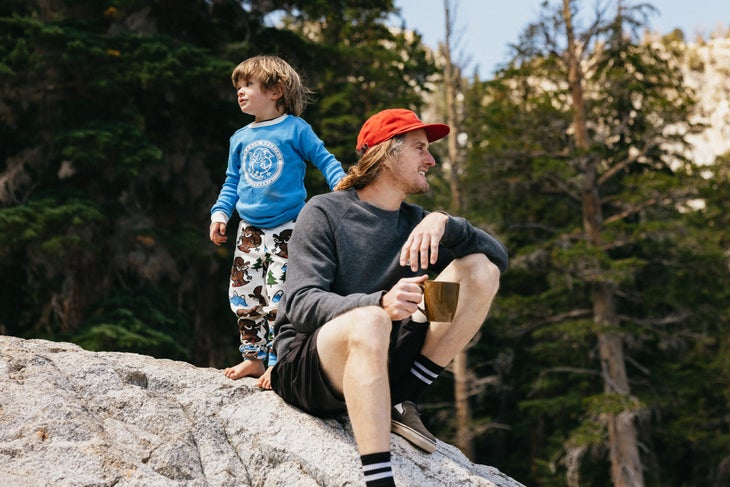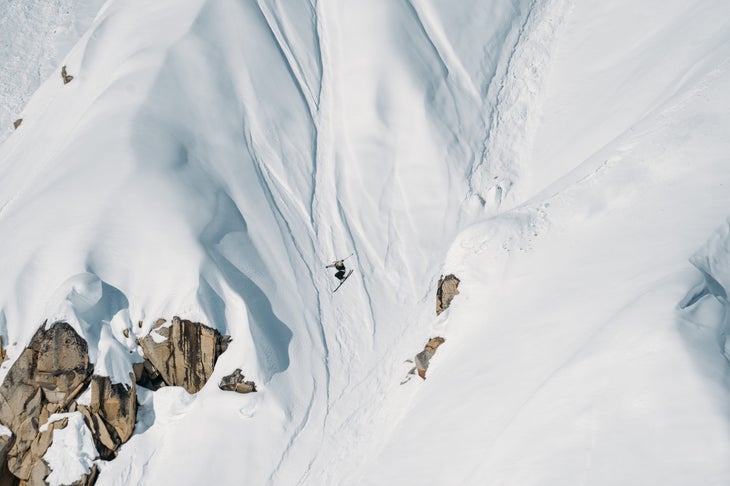“], “filter”: { “nextExceptions”: “img, blockquote, div”, “nextContainsExceptions”: “img, blockquote, a.btn, a.o-button”} }”>
Heading out the door? Read this article on the new Outside+ app available now on iOS devices for members!
>”,”name”:”in-content-cta”,”type”:”link”}}”>Download the app.
Sitting at the corner of the long dining room table, Eric Carter and Chris Benchetler were miming back and forth with gusto. The electricity of the conversation didn’t surprise me, after all the two pro skiers had both been on a tear of late—Carter carving out impressive lines in his home Coast Range and Benchetler wrapping up production on a multi-year action sports film with the Grateful Dead. I leaned forward to get a closer listen just as Carter finished up a particularly animated war story.
Watch: Warren Miller’s Ode to Ski Dads
“Then she coughed right in my mouth!” He said, eyes wide.
Benchetler, unfazed, leaned back in his chair, “Just wait till you have two kids.”
There was a catharsis in the laughter that followed. Each athlete had made a mark achieving the near impossible on skis, and over the past few years, both had also become fathers at home. The first came with plenty of fanfare, contracts, and a travel budget. The latter? A fresh and sometimes isolating challenge. Suddenly, these pros were beginners again.
Mouth cough aside, the back and forth felt refreshingly raw. In an alpine subset that often exalts individual strength and achievement, struggling at something new can oftentimes go undiscussed and unaddressed. Recently, however, Benchetler, Carter, and a growing number of pro skier dads are finding their voice and pooling their resources, sharing the kind of knowledge that might not otherwise appear in the generational mountain man handbook.
“Sugar coating it doesn’t do anyone any favors, but also scaring them away from it doesn’t help,” explains Benchetler. “It’s wonderful and difficult to be a parent. You have to be there to support.”
Benchetler knows just how important that support can be. After losing his father as a teenager, he was forced to navigate high school, university, and life as a young pro athlete without an in-home male role model. He says he leaned on a collective of older male mentors from different parts of his life—many, like the late Bill Walton, from outside the ski world—taking their many perspectives to shape his own idea of what being a dad and pro athlete could and should look like.
“A close family friend who had three girls really lent a helping hand early on,” says Benchetler. “No one really tells you about daycare waiting lists. Ok, daycare is full, what do we do now?”
And when Benchetler’s partner, pro snowboarder Kimmy Fasani, was diagnosed with Stage 3 inflammatory breast cancer in 2021, those new challenges amplified. How could he continue to show up as a partner, step up as a caretaker, and still take care of their two young boys, Koa and Zeppelin?

Much of that journey is documented in the family’s new film “Butterfly in a Blizzard,” an honest look inside parenting and cancer care balanced between the lives of not one, but two pro athletes. While Benchetler will be the first to say that Fasani has carried most of the weight, the pro skier behind “Fire On The Mountain,” has had his own ups and downs—often finding solid ground in male connections outside of his nuclear family.
“I’m leaning on friends and community now more than ever,” admits Benchetler. “I love seeing men be open about their feelings, worries, and concerns.”
It’s part of the reason he picked up the phone when Sam Kuch, runner-up at this year’s inaugural Natural Selection Tour ski event, called him last fall. Kuch, a 26-year-old pro skier from Nelson, B.C., was expecting his first child with his wife Jade, and the pressure was getting to him.
“I had this mini identity crisis,” he says. “I thought maybe people might perceive me differently, like maybe these teams, these sponsors wouldn’t want a dad.”
As his ego started to take hold, Kuch decided he needed to talk it over. He rang Benchetler.
“I’m honored he even called,” says Benchetler. “I have been there, I’ve experienced a lot, so if I can pass a little inspiration and knowledge on, I’m thrilled to do it.”
Kuch remembers the conversation lasting a half hour or so but claims that it was the voice of reason he needed in the moment. Teammates at Arc’teryx, Benchetler also recommended he speak with the brand’s sports psychologist, John Coleman.
Over virtual sessions, Coleman helped Kuch channel anxious thoughts around parenthood with a series of mental checks. After Waylon was born this past December, he brought those checks with him into the high alpine, tips that both Benchetler and Carter also rely on to keep their heads straight in the often-extreme terrain they travel through on skis.

In fact, Carter says it’s his parenting chats with Coleman, a skier and father himself, that have helped him find calm on more committed mountain missions. Carter admits he often struggled with bouts of homesickness after his daughter was born nearly two years ago. Deep in the mountains, the pangs of missing out were acute. He often watched as similar feelings affected those around him and worried it might cloud his own judgement. So, he talked to Coleman.
The sports psychologist’s advice? “‘[He said] ‘You choose to do this stuff,’” explains Carter. “You choose to go on these trips, so you need to be fully present.” He points out that many of these places demand full attention, and lapses could be dangerous, if not fatal. “I need to put my family out of my mind, which is hard, but could determine if I make it back to them at all.”
Carter also says it helps to join missions with other dads, an environment that carries an unspoken understanding within the group.
“It’s not like they’re necessarily going to be more conservative than someone without kids but knowing that we are all in a similar place, that it’s in the back of our minds,” Carter says. “That’s valuable to me.”
Round trips have always been the goal, but Benchetler, Carter, and Kuch all agree that returning home isn’t as seamless as it used to be. Learning exactly what that looks like has required its own adjustment period, something that Kuch learned after his long filming stint with Natural Selection Tour this past spring. Despite his excitement to come back to Nelson, his reentry threw off Waylon’s rhythm and stretched the young family to a friction point.
Anxious at first, he remembered Benchetler’s advice: to show up whenever and wherever he could. For Kuch, that started on the changing table. With Waylon on his back, Kuch went to work. Dubbing the every-other-hour sessions as “Guy Time,” he began earning his spot back on the family roster, one dirty diaper at a time.
